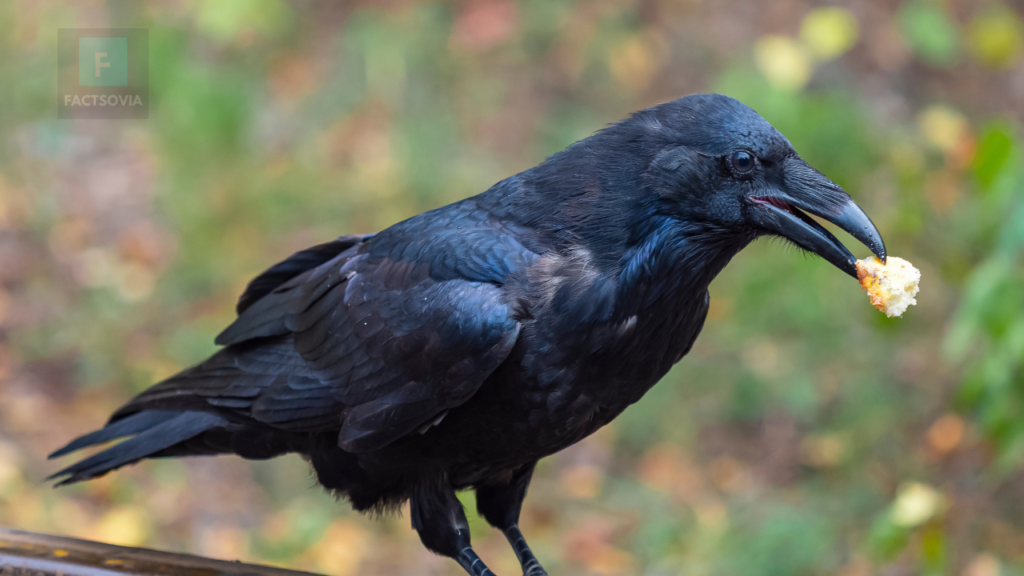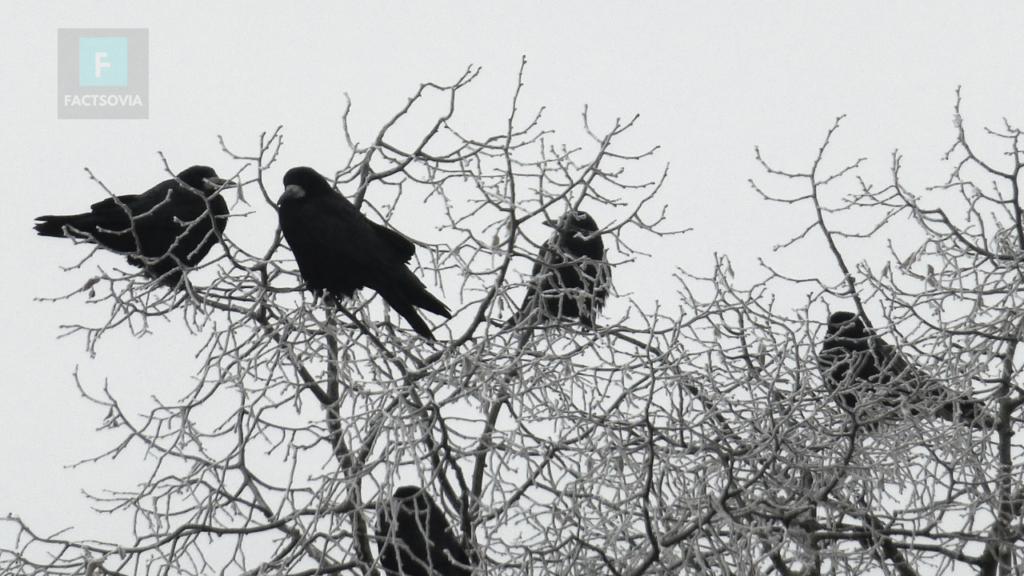We use affiliate links to run our site. When you buy through links on our site, we may earn an affiliate commission, without any added cost to you. Learn more
Crows are highly adaptable and intelligent birds known for their problem-solving abilities and diverse feeding habits. Their natural diet consists of a wide range of food sources, allowing them to thrive in various environments.
In this article, we will explore the dietary preferences of crows and their ability to consume different types of food.
What Do Crows Eat?
Crows are classified as omnivorous birds, which means they can consume both plant and animal matter. This adaptability gives them an advantage when it comes to finding food in different habitats. Let’s delve into the specifics of their dietary choices.
Crows are highly opportunistic and adaptable birds, belonging to the family Corvidae. Their natural habitat spans across various regions, from forests and farmlands to urban areas.
As omnivores, crows possess a wide dietary range, enabling them to thrive in diverse environments.
A. Seeds and Grains
As part of their natural diet, crows readily consume a variety of seeds and grains. These include corn, wheat, barley, and sunflower seeds, which they often scavenge from fields or granaries.
This primary source of sustenance provides them with essential carbohydrates, proteins, and fiber.
B. Fruits and Berries
Crows are known to have a fondness for fruits and berries. They are particularly attracted to juicy and colorful offerings, such as apples, cherries, blueberries, and elderberries.
By feasting on these nutrient-rich treats, crows obtain essential vitamins, minerals, and antioxidants that contribute to their overall well-being.

C. Insects and Invertebrates
In their quest for sustenance, crows take advantage of their sharp beaks and intelligent problem-solving skills to hunt for insects and invertebrates. From earthworms and spiders to beetles and caterpillars, these clever birds are skilled predators.
Their high-protein insect diet plays a vital role in their growth and development.
Crows are Opportunistic Scavengers
Crows possess an uncanny ability to adapt and exploit various food sources, including carrion and human-generated waste. This opportunistic behavior sets them apart from many other bird species, enabling them to survive in both natural and urban environments.
How A Crow is Different From A Raven?
A. Carrion
Crows are well known for their affinity towards carrion—the decaying flesh of dead animals. Their sharp eyesight allows them to spot carcasses from a distance, and they swiftly gather to scavenge on the remains.
By consuming carrion, crows play a crucial ecological role, aiding in the decomposition process while also benefiting from a protein-rich meal.
B. Trash and Waste
Urban areas present an abundant food source for crows in the form of trash and waste. Their keen intelligence allows them to navigate human settlements, identifying food scraps and discarded items that can sustain them.
Crows have even been observed using tools, such as sticks or wires, to extract food from hard-to-reach places, showcasing their resourcefulness.
C. Small Animals
Crows are opportunistic hunters and occasionally prey on smaller animals like mice, small birds, and even eggs. While this behavior may not be as prominent in their dietary habits, it demonstrates their adaptability and their ability to exploit various food sources.
Some Fascinating Feats About Crows:
Beyond their core diet, crows exhibit remarkable ingenuity and adaptability when faced with unique food challenges.
Their problem-solving skills and ability to manipulate objects have led to some astonishing discoveries about their feeding behavior.

A. Nutcracking
Crows have been observed using tools to crack open nuts with hard shells, such as walnuts or hazelnuts. They employ an ingenious technique by dropping the nuts onto hard surfaces from a height, harnessing the force of impact to access the nutritious kernel inside.
This behavior showcases their cognitive abilities and strategic thinking.
B. Water Manipulation
In pursuit of aquatic prey, crows have been observed using breadcrumbs or small objects to lure fish within reach. By dropping these objects into water bodies, they attract fish, which they can then catch and consume.
This creative feeding technique exemplifies the adaptability and innovation of crows.
C. Caching and Storing Food
Crows are renowned for their ability to cache and store food for future consumption. They bury surplus food in hidden locations, employing remarkable spatial memory to retrieve it later.
This caching behavior not only ensures their survival during scarcity but also demonstrates their forward-thinking and planning abilities.
Frequently Asked Questions (FAQs):
What do crows eat in the wild?
Crows are highly adaptable and versatile feeders. In the wild, their diet includes a wide variety of food, such as small animals and birds (both alive and as carrion), seeds, nuts, legumes, vegetables, flowers, bulbs, other plant matter, eggs, insects, earthworms, and other invertebrates. They are also known to scavenge human scraps and leftovers.
What do crows eat in the winter?
During the winter, crows adjust their diet due to the scarcity of insects. They shift to consuming more grains, nuts, fruits, and vegetables. They may spend time digging up insects from the ground, but they also rely on plant matter. Many crows frequent bird feeders and bird tables in search of food during this season.
What do baby crows eat?
Baby crows have specific dietary needs. In their first two weeks, they require extremely soft foods. The parents regurgitate food into the chicks’ mouths, which is a common practice among omnivorous birds. After about a week, the chicks are also fed soft grubs, maggots, and partially digested food.
Are crows omnivores?
Yes, crows are omnivores. While some crows lean more toward a herbivorous diet and others toward a carnivorous diet, all species of crows have the ability to consume a wide range of food to survive. For example, some crows prefer a meaty diet, including fish, crustaceans, and shellfish, while others may feed almost solely on fruits and nuts.
What should you not feed crows?
Crows should not be overfed with bread or processed foods. They should also avoid consuming mouldy food. Foods high in salt and sugar are not ideal for crows or other birds. Instead of bread, it is better to provide them with grains, seeds, and vegetable or plant foods.
Do crows like peanuts?
Yes, crows are fond of unsalted, unflavored peanuts. In fact, some people recommend giving crows peanuts to encourage them to bring “gifts” in return. Crows have been observed to bring humans shiny materials, plastic, glass, and stones as a token of appreciation when provided with peanuts or other energy-rich foods.
Do crows eat squirrels?
While it is possible for many crows to hunt squirrels, especially younger or injured ones, hunting a fully grown adult squirrel can be challenging for most crows. However, crows are known to scavenge and may consume already dead squirrels.
Do crows eat other birds?
Yes, it is common for crows to eat other birds. They are known for killing and consuming nestlings and fledglings of other bird species. Magpies, which are closely related to crows, also have a reputation for preying on baby birds.
Do crows eat other baby birds?
Crows and other members of the Corvid family are known to eat baby birds, both as fledglings and nestlings. If crows find unattended bird nests, they may consume the baby birds and eggs. However, it should be noted that crows usually don’t actively seek out other baby birds for food unless easier meals are scarce.
Do crows eat mice?
Crows regularly consume mice and other small rodents and mammals. While they are capable hunters, they are not highly specialized in hunting fast-moving prey like mice. However, they opportunistically feed on mice when the opportunity arises.
Conclusion
As we have delved into the world of crow dietary habits, it becomes evident that these intelligent birds possess a remarkable versatility in their food choices. From a foundation of seeds, fruits, and insects, they ascend as opportunistic scavengers, thriving on carrion, waste, and small animals.
Their astonishing feats, such as nutcracking, water manipulation, and food caching, further highlight their ingenuity and adaptability.
Next time you encounter a crow, take a moment to appreciate its resourcefulness and dietary prowess. These captivating creatures remind us that the world of avian intelligence is filled with surprises, and their ability to adapt to various food sources is a testament to their remarkable survival skills.
So, keep an eye out for these feathered friends and marvel at the culinary choices of the crow.
Amazon and the Amazon logo are trademarks of Amazon.com, Inc, or its affiliates.
